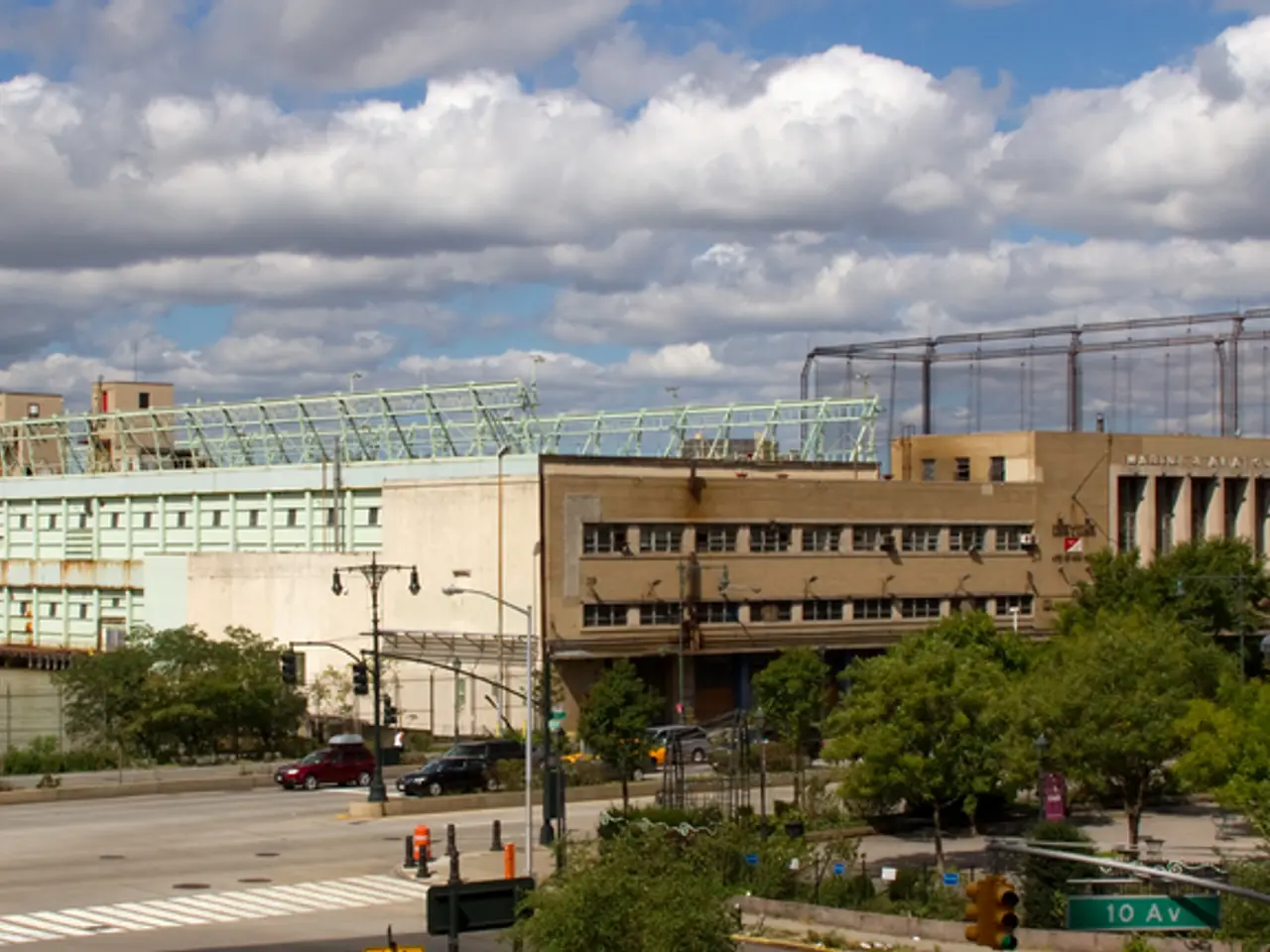Administration initiatives aimed at enhancing public works and facilities
In a bold move to transform Portugal's economic landscape, the new Portuguese Government, led by Prime Minister Luís Montenegro, has unveiled an extensive infrastructure plan aimed at modernising airports, railways, roads, ports, clean energy, public infrastructures, digital infrastructure, and major public investments.
**Airports and Air Travel**
Construction is set to begin soon on the long-awaited Luís de Camões Airport, a modern facility designed to enhance national and international connectivity. The government also intends to reinforce the national airport network, with plans to improve capacity and services beyond the new airport. Furthermore, there is an intention to advance the privatization of TAP, the national airline, a subject of extensive political and public debate.
**Railways**
High-speed rail links are a key priority, with the government aiming to complete connections between Porto and Lisbon, Porto and Valença, and Lisbon and Caia. Efforts will also focus on expanding metropolitan rail networks, notably extending service to the Setúbal municipality, enhancing suburban connectivity and mobility.
**Roads**
Road infrastructure projects, such as the upgrading of the IP3 road between Viseu and Coimbra to a highway profile, will be completed. This route, known as one of Portugal's most dangerous, will see improvements in safety and traffic flow following the upgrade.
**Ports and Maritime Facilities**
The government has signalled its intention to strengthen strategic port infrastructure, although specific projects have yet to be detailed. Upgrading port capabilities is likely to support trade and economic growth as part of the overall modernization.
**Clean Energy and Green Transition**
The government has aligned with EU initiatives such as REPowerEU to expand investments in green energy and energy security. Efforts include promoting net-zero technologies with new incentive schemes and simplifying permitting procedures for clean energy projects. A significant focus exists on accelerating decarbonization of transport through expanding electric vehicle charging infrastructure, reforming regulations to liberalize the market, enhance transparency, and reduce costs for consumers.
**Public and Digital Infrastructure**
Public infrastructure modernization includes urban regeneration projects like the EM510 rehabilitation in Lisbon’s Benfica district, supported by EU recovery funds. This project will deliver thousands of affordable housing units by 2026, exemplifying the government’s priorities on social infrastructure and sustainable urban development. Digital infrastructure investments aim to support the green and digital transitions, ensuring better connectivity and technological integration across the country.
**Major Public Investments and Planning**
The government’s programme involves finishing long-stalled works and implementing new strategic projects aimed at repositioning Portugal within Europe’s economic context. Ten key reform priorities form the backbone of this plan, seeking ambitious improvements across sectors, backed by both national funds and substantial EU recovery allocations.
In summary, Portugal’s new government is committed to a multifaceted infrastructure renaissance: advancing critical transport projects (airports, rail, roads), accelerating energy decarbonization, modernising public and digital infrastructure, and harnessing EU recovery funds to foster long-term sustainable growth and safety improvements.
Journalist Bruno G. Santos, with a press card number 8463, is one of the passionate travellers and writers who will be documenting this transformation, sharing stories about other cultures, hidden gems from Portugal, and the world.
[1] Government of Portugal (2022). Recovery and Resilience Plan. Retrieved from https://www.gov.pt/pt/government/recovery-and-resilience-plan [2] European Commission (2022). Portugal's Recovery and Resilience Plan. Retrieved from https://ec.europa.eu/info/public-opinion/archives/eurobarometer/2022/special_edition_400_recovery_and_resilience_plan_2022/pt_pt/national-recovery-and-resilience-plans [3] European Investment Bank (2022). Portugal's Recovery and Resilience Plan. Retrieved from https://www.eib.org/en/projects/portugal-recovery-and-resilience-plan [4] European Parliament (2022). Portugal's Recovery and Resilience Plan. Retrieved from https://www.europarl.europa.eu/news/en/headlines/politics/20220629STO84788/portugal-approves-recovery-and-resilience-plan [5] European Commission (2022). Portugal's Recovery and Resilience Plan: Key Investments. Retrieved from https://ec.europa.eu/info/public-opinion/archives/eurobarometer/2022/special_edition_400_recovery_and_resilience_plan_2022/pt_pt/portugal-recovery-and-resilience-plan-key-investments
- The Luís de Camões Airport, a modern facility that will significantly boost national and international connectivity, is set to be built in the Algarve region as part of Portugal's extensive infrastructure plan.
- In the realm of sports, the Portuguese Government's strategic investment in modernizing airports, railways, and roads is expected to support increased travel for sports events, contributing to a dynamic sports environment in Portugal.








